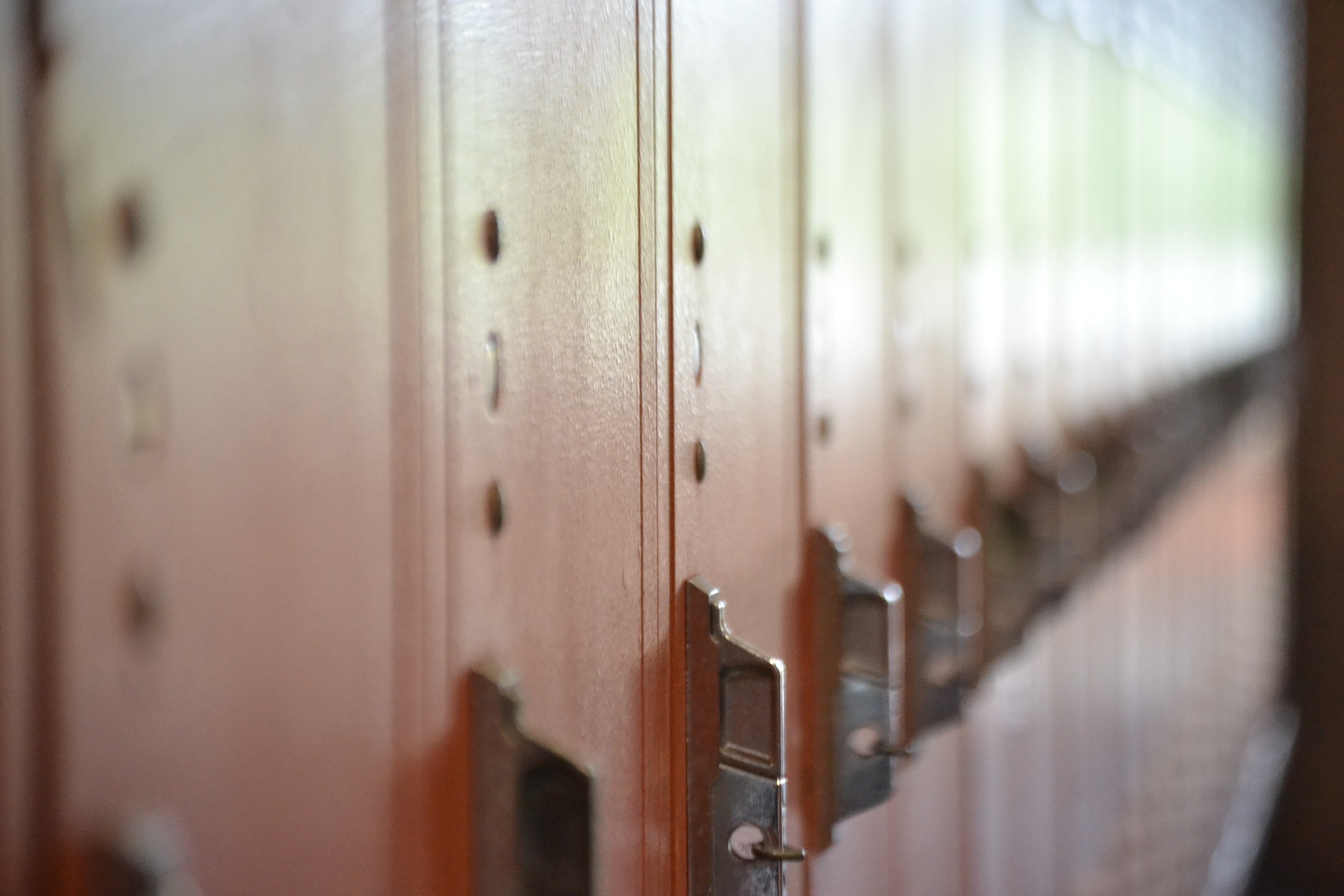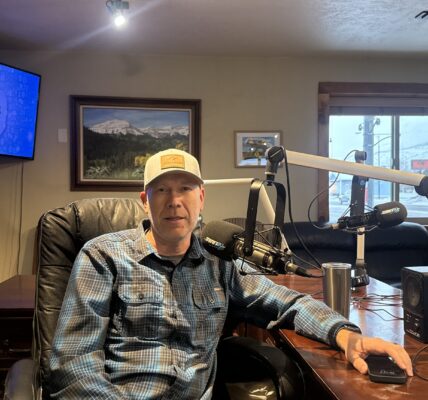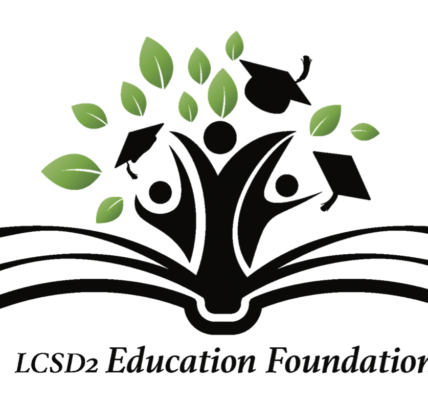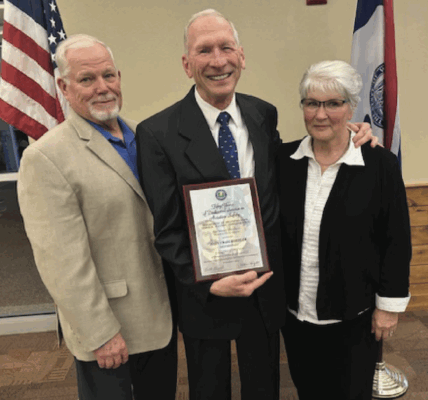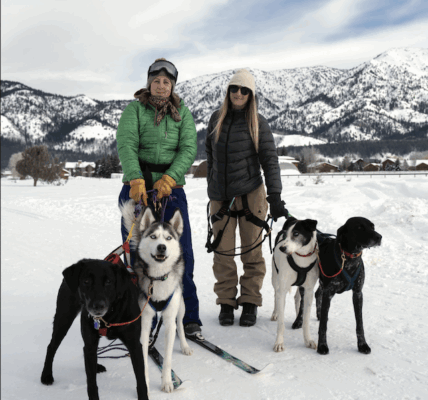◆ First day of school is only days away.
By Lincoln Teichert
SVI Media
Authors Note: Below are three interviews with principals, past and present, of the Cokeville Schools.
Brian Toomer
What is your favorite thing about working in Cokeville?
BT: My favorite things about working in Cokeville are the traditions of high expectations of success, as well as the great families and kids
You had to give up coaching to become principal. What has that sacrifice taught you?
BT: Extra curricular activities are important to me. I feel they are great motivators and teach so many real life skills. So I miss being involved with the kids in that environment. But I feel this experience has taught me that athletics aren’t everything.
It’s pretty safe to say that you love to fish. How has that hobby impacted you?
BT: I do love to fish. Fishing has introduced me to some great friends and opportunities that help me get away from the stresses of this job. When I get out on a lake it’s really relaxing.
Education has been around as long as man has, so philosophies about it abound. How would you describe your educational philosophy?
BT: My philosophy about learning; we all can learn. We may learn at different levels and pace, but we can learn with hard work, a positive attitude and determination.
How does your philosophy connect to your efforts during the COVID-19 pandemic?
BT: COVID-19 has created a major shift in the learning environment for all involved. Last spring our kids, parents, and teachers all had to test their own willingness to adapt and make this a learning opportunity. Now looking to try and get back to some normalcy this fall-well my philosophy that all can learn is a driving force. I do feel, even when our learning environment isn’t ideal, we can learn if hard work is applied, a positive attitude is exhibited, and we work together with determined focus.
What have you learned from your time as a principal in Cokeville?
BT: I have learned that being a principal looks a lot different when you’re not a principal than when you are a principal. It is a humbling position when you are responsible for both kids’ and adults’ choices and behaviors. One example of this is at ball games. Coaches, players, fans behaviors and their choices, fall back on me and our schools and communities reputation.
What should students do this summer to be ready for school in the fall?
BT: Students should continue to read as often as they can. They need to prepare themselves to learn in a variety of environments; online, remotely, face-to-face.
You talked about how your philosophy of learning is that all people can learn with hard work, positive attitude and determination. What makes those things so important?
BT: I’ve just observed over a fair amount of years that when any of us apply those three things to a situation we can make progress. We can learn. We can improve. So I just feel pretty confident, pretty strong about those three things. If you apply that you’re going to have some progress. Now is it perfect? No. Some people just have more ability to learn certain things. It just comes easier for them but I’ve seen those three things are pretty consistent. When they’re applied you’re going to have progress.
Where did you get that idea?
BT: I contribute a lot of that type of mindset to my experience with special services, to working with kids with different needs. I’ve just observed that over quite a few years in that population. I’ve worked with a lot of diverse learners. Again, just putting those three things together I think people can…no matter where you’re at in life or where you’re at with ability, you’re able to improve and make progress and be successful in some way or another.
I appreciate you giving me this opportunity.
Keith Harris
What was your favorite thing about working in Cokeville?
KH: The people. Great people. Salt of the earth. Very very good people and then of course it’s always fun to be part of something of quality. Cokeville and Lincoln #2 school systems are quality. It’s always fun to be part of something that is really good. Something of high quality. So quality people, quality system it’s just a pleasure to be a part of it.
You built a couple homes while you lived in Cokeville. What did you learn from those experiences?
KH: Well I didn’t learn enough, because I wasn’t smart enough, Lincoln, to not do it again.
Do you just like home building?
KH: You know, it was just something, it was a skill I kind of had and I knew a little bit about it and it was a way for me to apply something that I knew and to apply a skill that I had. It’s always fun too. I don’t know I think it’s probably crazy but it’s fun to make something from nothing and build something out of it. And that’s what you do when you build a house…is you, you kind of start from scratch and you create something.
You saw families move in and out, teachers come and go, and kids grow up and graduate. Who came up with the idea to integrate iPads into the school curriculum?
KH: The idea came up ….really I’d like to say we were innovative and in all honesty we kind of followed the national trend. It’s kind of interesting when iPads were first rolled out I went to a conference in Philadelphia. I went to an iPad-Apple put on a session there-and an Apple representative said that when they rolled out the iPad they had no idea that’s Apple-Apple had no idea that it was going to be education that was going to be big, would have the greatest impact from the iPad. What a huge tool the iPad was going to be in education. So right from the very start those iPads were a natural fit for education and so having the application in the classroom, they’re inexpensive, they’re pretty tough and all the assets, all the educational resources that a computer has only in a very convenient package. And the other thing now when we take a look at what one-to-one education is doing, is it’s providing the opportunity to personalize learning for kids. It’s providing kids the opportunity to go as slow or as fast as they need to go in order to master the identified content-the identified essentials. So as education continues to evolve, technology and iPads being part of that technology, I believe will just continue to play a bigger, more critical role. I’d like to say I was a genius but in all honesty we just kind of followed the trends the country was discovering along with us the value that that technology could have in a classroom.
I’ve never heard the term “one-to-one learning.” Could you elaborate on that?
KH: Okay one-to-one is just where everyone has access to a school provided device. So one-to-one is where kids no longer have to share a computer lab but rather they have a device that is checked out to them they have access to it throughout the school day and when they go home at night.
Education has been around as long as man has, so philosophies about it abound. How would you describe your educational philosophy?
KH: It’s about providing-ensuring-learning for kids. For a long time education has trends that come and go, but the one thing that remains constant-whenever education is being done right-you’ll see that throughout history, when education gets it right, they’re focused on students learning rather than teaching, rather than fads. Rather than technology, rather than new ideas, they’re focused on kids learning the content they need to learn. And when that’s the focus, education is right, it’s getting it right. So when you say “what is my philosophy,” it’s all about student learning. It can’t be about the adults in the room. It can’t be about providing opportunities to learn. It’s got to be all about guaranteeing and ensuring that kids actually do learn. That really has always been my philosophy and the longer I’m in this crazy game, the more solid I am in that philosophy. That it’s about guaranteeing that students learn what they need to know.
I remember one of your speeches-it was about how “there is always room at the top for the best” and your belief that the students at Cokeville high school could rise to the top and stay there throughout their lives. How can students rise to the top with the ongoing pandemic?
KH: Students can rise! I honestly believe that students have more opportunity to rise to the top now than ever before. Students who remain focused on what’s important, rather than allowing all of the noise-white noise and distraction-the pandemic and other crises can provide, if you can ignore the white noise and stay focused on what is important, you have an ability to rise now to the top now more than ever before because the opportunities are still there. In fact. the opportunities are greater than ever for someone who is willing to be the best. You’ve gotta be willing to look past and ignore the white noise and not be distracted by it and be focused on what is important. Like I was saying before, what’s important hasn’t changed. Mastering those essentials. Learning what’s important has never changed. If they’ll stay focused on what’s important there’s still room at the top for the best. Always has been, always will be. And I think this pandemic will just make that even more…bring that even more, not less.
Couple questions left. What did you learn from your time as a principal in Cokeville?
Surround yourself with really good people. Good people make for a good leader. I had the opportunity in Cokeville to be surrounded by-and recognize the value of-really, really good people. Some of the finest people I’ve ever associated with there. That was mostly in Cokeville and also at the district level there. I had the opportunity to associate with really good people who made me a better person. So one of the things I learned in Cokeville was just the value of associating with really good people. Quality people. It made me a better person.
Anything you’d like to add?
I believe that Cokeville, Star Valley, Lincoln County Wyoming is a special place. I guess I would just tell everybody to take advantage of-wake up every day and just take a minute-to be grateful for the things that are good in your life and the blessings that you have from being able to be a resident of that special place. I would tell people to always remember to be just a little grateful for being able to be a part of that special place. I hope everybody takes advantage of that opportunity and recognizes what a blessing that is. That they’re grateful for it.
Harold Hatch
What is it like to be a principal for an elementary school?
HH: It is a great job. I enjoy the interactions I have with all the students, the staff and parents- and that’s the highlight of my job-interacting with all of those groups of people and watching the kids learn and grow. It’s challenging. It’s a challenge keeping up with education, but the rewards are wonderful. Seeing kids do things they didn’t think they could do and also seeing things that they struggled with at one point in time-they master them-and they’re doing great.
How did teaching first grade prepare you to be a principal?
HH: Yeah that’s a good question. So the nice thing about teaching is when you move to the administrative position, is you’re still spending a good third of your time in the classroom and trying to continue to help teachers put in good teaching practices. So all of the time I’ve been trying to develop good teaching practices, and what works for kids and what doesn’t work, will allow me to-hopefully-pass on some of those skills to other teachers so they can use them in the classroom.
Cool. So what do you like most about your job?
HH: The thing I like most about my job is getting to know students. Yep. I love getting to know them, I love interacting with them, I like hearing the successes that they’re having, I like hearing about the challenges they’re having, and how they’re trying to come up-and just-you know interacting day to day is my favorite part of the job.
So this is more of a personal question. What do you love to do in your spare time?
HH: That is a great question! So, I love to hike. I really like to hike. I like to run. I actually really like to look at the stars at night time-I mean astronomy and all of those sorts of things-I like to fish and I like to play basketball quite a bit. Those are all things I really enjoy doing.
Cool. How do those things help you be a good administrator?
HH: I think for me no matter what walk of life or what profession you’re in, you always need to have relief from the day to day stresses and worries and grind of all of that. So for me when I’m doing those things it allows me to take a break from the worry and decisions, from that type of thing, and refresh the mind, refresh the inner self-all of those things-and just refocus again on the job. So I think it’s healthy for everybody to have a break.
Education has been around as long as man has, so philosophies about it abound. How would you describe your educational philosophy?
HH: My philosophy is simple. I think this philosophy will also be around until the end of time. My philosophy is on teaching students-helping them learn-that you’ve got to do two things above all else: you have to care about the kids and you have to challenge the kids. I tell my staff that. You can’t have one without the other. If you’re just the likable, nice, caring, not challenging [students] are never going to be pushed to do hard things. And if you’re always challenging and pushing and not showing them that you care, then you come across as pushing and forceful and kids take all of that the wrong way and sometimes do not do their work because you’re coming across real harsh about it. But if you can have a combination every day of: I care about you, I’m going to challenge you to beat your best, I’m going to do those things every day, I think that is where the kids respond and give effort and do things they didn’t think they were capable of doing and are motivated and inspired to be better. That’s my theory and I’m sticking to it.
How will you implement caring about kids and challenging kids with the changes brought about by COVID-19?
HH: Great question. So we have the motto in our school “Cokeville Elementary: where it’s cool to be kind,” and with that we create a plan every year of little steps, things we can do day to day in our school to promote kindness and that is the focus on the caring part of our philosophy. We as a staff want to care about our kids but we also want to drive that down and have that as a standard practice with our kids, and motivate them to come up with ideas each year. We do that every year. Sixth graders take the lead in that and help set the tone with all of that. They help create and come up with ideas for that. And then with the challenge part we just try to talk with kids to set goals and push them that way so they’re doing their best on assignments, they’re getting good grades, they’re able to do well on a test. Whatever it is we talk with kids about setting goals and pushing kids. A lot of that, I think, is very personal, a lot of it just doesn’t show up on the hallway or on TV or on the big screen or whatever, but teachers just saying individually “hey, I think you can do this. I know this concept is hard for you right now but let’s try and get the assignment done and then try to get that one and do well on the test.” A lot of that stuff is very individual. It’s not real flashy or public but we try and do those things on a regular basis. I don’t see that changing with the coronavirus. There might be assignments modified. We might be in school or out of school but those things-caring for kids and challenging kids-happen whether they’re in the building or not.
What is your number one priority for Cokeville Elementary School?
HH: So I’ve said this before, my number one is that I want every student to feel cared for and challenged. That is number one. I feel like I’ve repeated that a lot today but also when kids leave Cokeville Elementary I hope we’ve taught them three things, three things that will help them in their life. Number one (and it’s not in any particular order), we want to teach kids how to read, we want to teach them to be successful readers. Number two, we want them to know how to think; think for themselves, think through a problem, think through the steps of how to solve the question. And then number three, we want to teach how to get along with other people. So I guess you could say those are just three skills we have them leave with. Learn to read, learn to think, and learn to get along and if they can have those three things I think those are things that will benefit them in any job or endeavor that they pursue in their life.

